Residency Curriculum
Surgical Curriculum International Experience Microsurgical Training Lab Phacoemulsification Training Clinincal Rotation Structure PGY2-4 Didactics Research Curriculum
Residency Surgical Curriculum
A PGY-specific wet-lab curriculum takes place throughout the academic year in the Chez Ophthalmology Microsurgery Laboratory. The curriculum is composed of 2-hour hands-on wet lab sessions led by 1-2 faculty members. The wet lab is also open and available to residents for practice on their own time.
|
PGY-2 Wet Labs |
PGY-3 Wet Labs | PGY-3 Wet Labs |
|
|
|
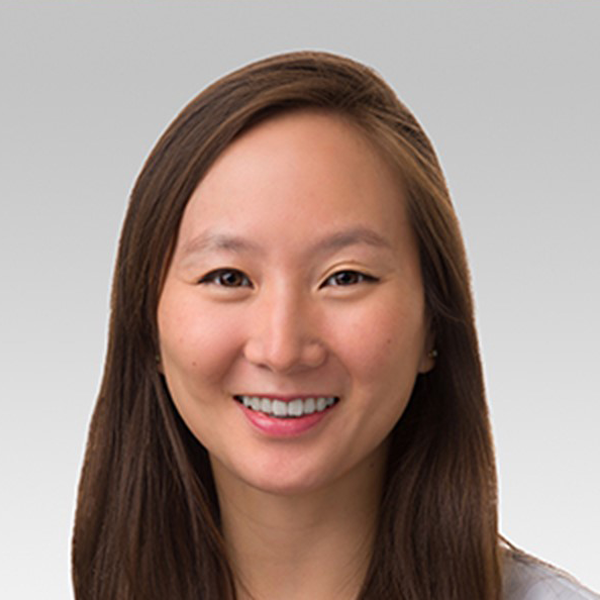 |
Minjy Kang, MD, MA Associate Program Director Co-director Residency Surgical Curriculum |
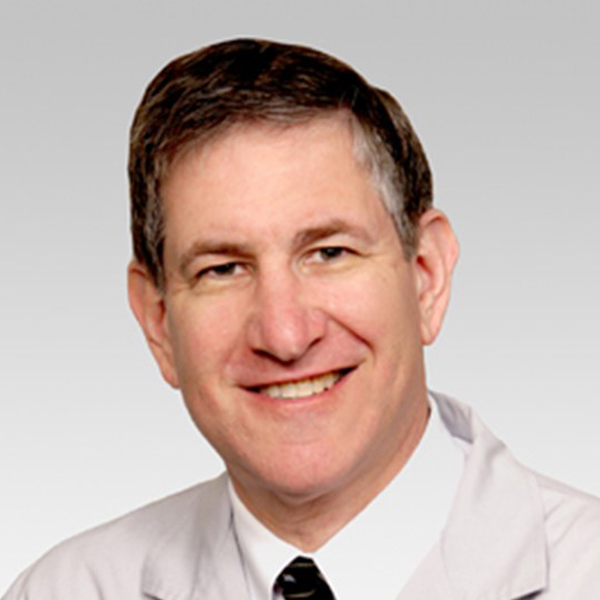 |
Robert S. Feder, MD Co-director Residency Surgical Curriculum |
International Experience
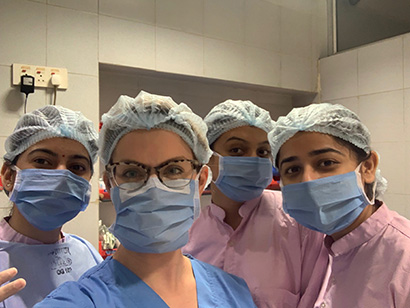
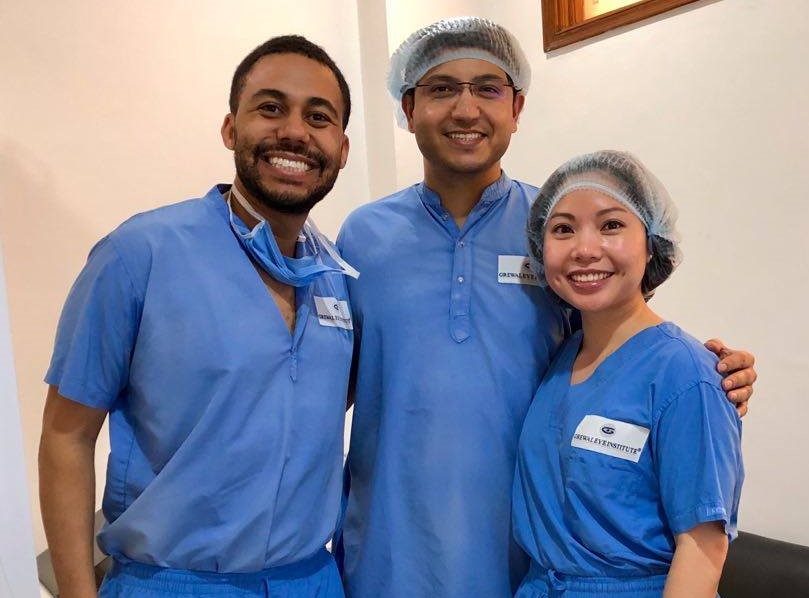
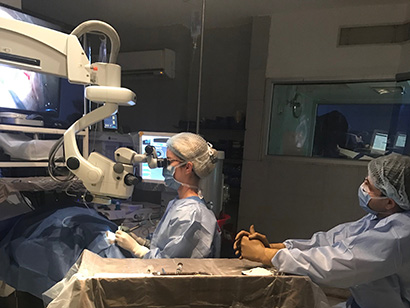
Through our partnership with Grewal Eye Institute in Chandigarh, India, we provide a robust cataract surgical experience. This optional surgical rotation introduces the resident to delivering ethical, high-quality care to a socioeconomically challenged sector of the population.
Department of Ophthalmology Microsurgical Training Lab
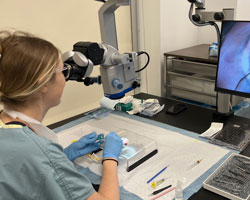
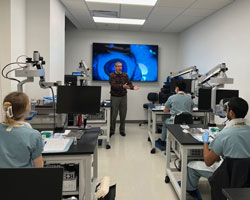
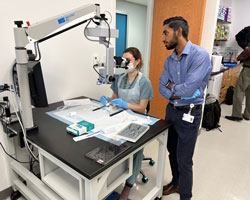
Dr. Robert S. Feder instructs trainees during a recent Anterior Segment Web Lab
This laboratory is the realization of a long-held dream, which could not have been realized without the generous gift and support of Ron and Athena Chez.
Training in a microsurgery lab enables a resident to experience the hand-eye coordination required when using a surgical microscope. Selected steps of cataract surgery, oculoplastic surgery, retinal surgery, and eye muscle surgery can be practiced and proctored in a relaxed and supportive environment.
Our new laboratory has 6 workstations with state-of-the-art Haag-Streit operating microscopes, each with an attached video monitor and an adjustable worktable. Each video monitor is easily connected with an 80-inch monitor on the front wall which facilitates demonstration as well as power point presentation. Video images can be sent to other locations or received from other locations. Residents can record their work for later review. Each workstation has a complete set of high-quality microsurgical instruments.
Our wet lab also has an Eyesi computer simulator which helps residents to master more challenging steps in cataract and retina surgery. The Eyesi program guides the resident through these steps until proficiency is attained, recording the progress along the way.
Northwestern Phacoemulsification Training Course
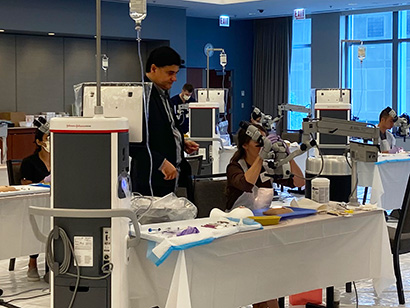
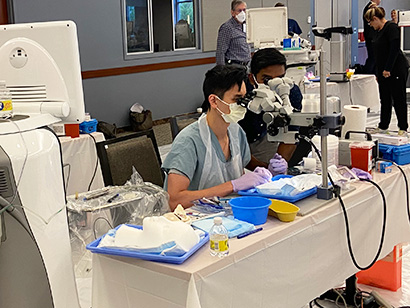
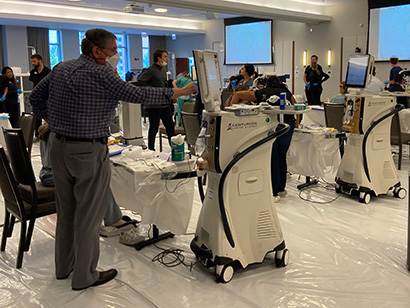
Every year residents also participate in the Northwestern Phacoemulsification Training Course, a two-day didactic and wet lab course that offers a customized curriculum for surgical teaching for each year of residency training. Learn more about this event.
Surendra Basti, MD discusses aspects of the residency surgical curriculum, including the India rotation and the annual phacoemulsification course. View the video.
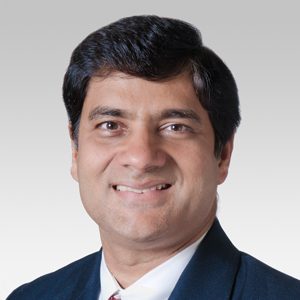 |
Surendra Basti, MD Director of Resident Refractive Surgery Curriculum |
PGY-1 (Internship)
- Ophthalmology Urgent Care (3 one-month blocks at Northwestern Memorial Hospital)
- General Surgery (3 one-month blocks at Northwestern Memorial Hospital)
- Internal Medicine (2 one-month blocks at Northwestern Memorial Hospital)
- Emergency Medicine (2 one-month blocks; 1 at Northwestern Memorial Hospital/1 at Jesse Brown VA Medical Center)
- Electives (2 one-month blocks at Jesse Brown VA Medical Center)
PGY-2
- Comprehensive Ophthalmology at the Jesse Brown VA Medical Center
- Uveitis
- Retina
- Pediatric Ophthalmology at Lurie Children’s Hospital
- Glaucoma
- Neuro-Ophthalmology
- Plastics
PGY-3
- Retina
- Cornea
- International Surgical Elective
- Discovery Elective
- Pediatric Ophthalmology at Lurie Children’s Hospital
- Ophthalmology Urgent Care
- Ophthalmology Inpatient Consults
- Comprehensive Ophthalmology at the Jesse Brown VA Medical Center
PGY-4
- Senior Surgical Rotation
- Pediatric Ophthalmology at Lurie Children’s Hospital
- Comprehensive Ophthalmology at the Jesse Brown VA Medical Center
- Specialty Elective
Intern Didactics
The PGY1 residents have a dedicated didactic curriculum to learn basic exam skills and introduce topics in ophthalmology. These sessions take place during the ophthalmology and elective rotations. Online knowledge-based lectures are provided to interns to learn at their own pace, while in-person hands-on and interactive sessions take place with two interns and one attending at a time.
PGY2-4 Didactics

The Chicago Curriculum of Ophthalmology is a lecture series on Saturday mornings from 9-11 am from September until April. It is a citywide curriculum that all six ophthalmology residency programs participate in, featuring the city’s best speakers.
Resident Research Curriculum
The goals of our research curriculum are to teach our trainees a foundation in the scientific method, develop the skills to critically review and interpret scientific literature, and provide the necessary information and framework to complete a high quality research project.
Our curriculum includes didactic experiences, interactive journal clubs, and a structured timeline for research progress. Our didactics cover the scientific method, statistical analysis, grant writing, the electronic data warehouse (a tool to interact with the electronic health record via specific queries), the institutional review board (IRB), research compliance, ethics, and an introduction to different research study designs. These experiences are intended to provide the background information that is necessary to design a research study, get IRB approval and grant funding, execute the study, and appropriately analyze the results.
The journal clubs are focused upon the design of research studies and the validity of the results. Rather than focus on the information learned from the manuscript discussed, our journal clubs offer an interactive environment to teach our residents how to critically dissect a manuscript, decide if it is applicable to their patient populations, and how to implement the results into clinical practice. Furthermore, this process should be illuminating for future manuscript preparations of their research projects.
Our structured research experience includes a discrete timeline for our residents to execute their research thesis. The timeline includes selecting a mentor, choosing a project, finding an advisory committee to help with project development in a small group setting, proposing the project at our research grand rounds for department level feedback, applying for IRB approval and grant funding, executing the project, presenting the interim results at research day, submitting the results to research meetings, writing and publishing the manuscript, and presenting the work at international and local research meetings.
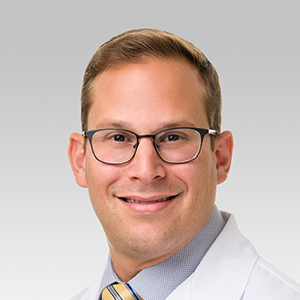 |
Jeremy A. Lavine, MD, PhD Director of Resident Research Program |
